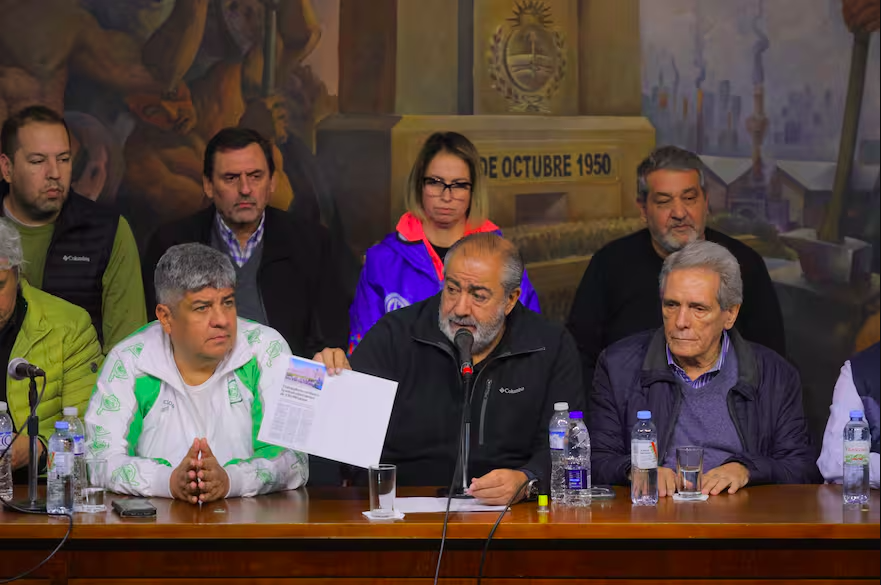
Published 05/09/2024 20:20 | Edited 05/09/2024 20:48
The General Confederation of Labor (CGT) today launched a general strike that was described as “strong” and “successful”, marking the second demonstration in five months against the government of Javier Milei. The unionists, gathered at the historic headquarters of the workers’ union on Rua Azopardo, argued that the resounding strike had “social and political support” and asked the government to “take note” and change its adjustment policy.
“Today, we carry out a political strike because we are discussing all the actions that are damaging the fabric of our country. The government must take note to rectify its adjustment policy”, stated Héctor Daer, one of the members of the command triumvirate. His response made reference to the government’s repetitive disqualifications that “the strike is political”. Daer highlighted that indicators such as the real drop in budget items for pensions, public works, transport subsidies, transfers to the provinces and cuts to universities and social programs justified the need for the strike.
The strike sparked controversy and division among politicians and union leaders. Peronist governor Osvaldo Jaldo criticized the strike, arguing that shutting down the country will only lead to economic loss. However, the CGT defends the strike as a necessary measure to draw attention to the issues facing Argentine workers.
Daer had previously listed some indicators: a real drop of 31% in budget lines for retirement and pensions, 87% in public works, 39% in transport subsidies, 76% in transfers to the provinces, 18% in cuts to universities and 13% in social programs. The leader of the Health union showed a newspaper clipping showing the drop in the purchasing power of salaries and the collapse of industry and construction.
“And now there is a half-sanction in Deputies (to the Basic Law) that gives powers to the Executive Branch to dissolve public entities without just cause. It is not clear what limits they will impose (on the government) -Daer lamented-. They say that because of labor legislation there are informal workers, but with this bill 600,000 workers move from formality to a formal illegality scheme. That’s why the strike agenda is forceful.”
The unions reinforced their rejection of the Basic Law and the tax package that received half approval in the Chamber of Deputies. The unions plan to meet with radical senators to try to convince them to reject the initiative, while the CGT does not rule out a mobilization to Congress on the 23rd of this month, when the projects are due to be voted on in the Senate.
At the press conference led by Héctor Daer, unionists highlighted the “political and social support” of the strike, highlighting the drop in purchasing power, the decline of the industrial sector and the scarcity of inputs in community kitchens. In response to the government’s attempts to criminalize strikes through a decree, unions reaffirmed the constitutional right to strike and threatened further forceful measures if there were no policy changes.
An episode that marked the day was when the Minister of Security, Patrícia Bullrich, took the lead early in the morning, in a gesture that sought to support the buses that were circulating during the strike, she boarded one of the lines that passed through Constitución station. However, the card she used did not have credits to pay for the ticket. For Dae, the “success” of the forceful measure was seen in this fiasco: “There was no one inside the bus”, insisted the blind manager, referring to the passengers.
Unionists pointed to a high level of support for the strike, with Pablo Moyano, leader of the truck drivers, highlighting that no form of transport circulated. However, the company DOTA, which controls a significant part of the buses that circulate in the Buenos Aires Metropolitan Area, did not join the strike.
“The strike hurt them,” said Pablo Moyano, assistant secretary of the Teamsters, and highlighted that if President Javier Milei maintains the cut, the workers’ confederation will maintain the fight plan.
The CGT conference, marked by a relaxed and calm atmosphere, highlighted the unions’ willingness to discuss each issue with the government, despite evident political tensions. The CGT strike, although it caused some disruption to commercial and transport activities, highlighted the determination of workers to make their voices heard against policies they consider harmful to the country.
Tightrope negotiations
Although Milei followed the advice of his more diplomatic team and sought to avoid media confrontations with the CGT during negotiations for labor reform, the forcefulness shown by union leaders, especially Héctor Daer and Carlos Acuña, harms the relationship, triggering the most offensive side of the president.
The government evaluates the behavior of union leaders as treason, especially after concessions made in the labor reform and the clashes in the Senate to stop the Basic Law. Labor Secretary Julio Cordero, who tried to promote dialogue with combative unions, saw his tools weakened by the CGT’s stance.
However, the government still hopes to move forward with initiatives such as making union contributions voluntary and considering union blockades as a serious harm to work, despite resistance from the CGT. Talks with the PRO and União Cívica Radical, both in the opposition, could pave the way for a joint strategy, but the government hopes this will happen after the debate on the Basic Law and if the unions intensify their attacks.
Thus, Milei faces a delicate moment, where the balance between “hawks” (more offensive) and “doves” (more diplomatic) in his administration seems increasingly fragile. The new stage is characterized by a more rigid stance, with fewer concessions and more pressure to move forward with reforms, marking a significant change in the government’s political approach.
Source: vermelho.org.br

